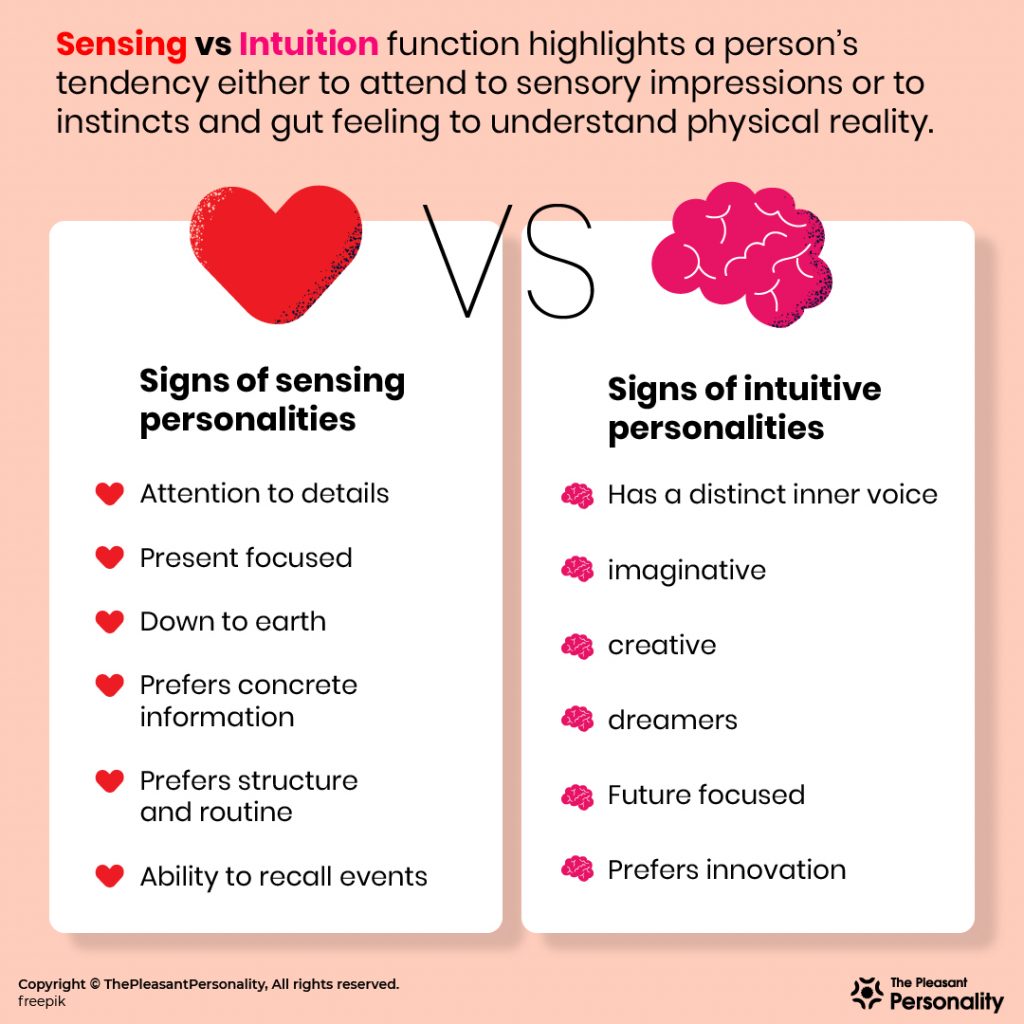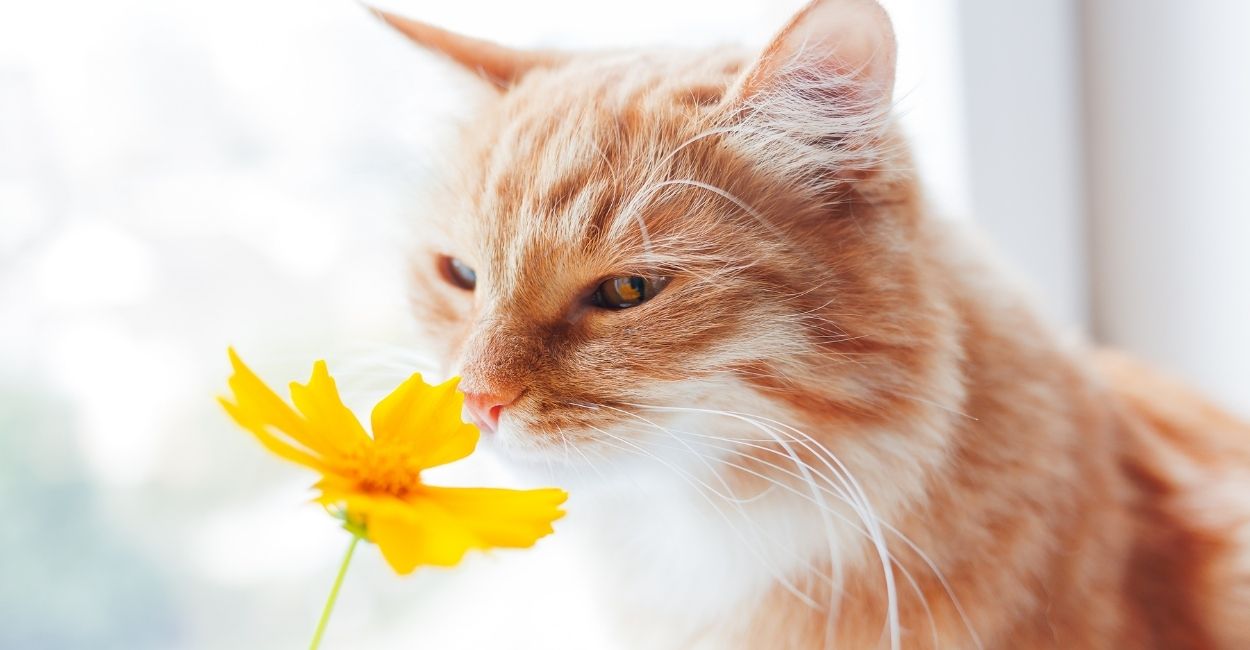Key Takeaways
- Sensing vs intuition refers to perceptual preferences.
- Sensing types are inclined towards using the five senses in receiving outside information.
- Intuitive types believe in patterns, impressions, ideas, and future possibilities.
- Sensing personalities are present-focused and pay attention to details.
- Intuitive people are imaginative. They love to dream and create new ideas.
- Intuitive people love abstract concepts while sensors prefer concrete information.
Sensing vs intuition preference used in the Myers Briggs type Inventory describes a person’s inclination of taking in information either through the use of five senses or by making patterns, ideas, and possibilities from the received information.
These two cognitive functions illustrate perceptual tendencies. Thus, if you are the one who pays attention to physical reality closely and connects to things by using the five senses, you are using the sensing function more than anything else.
However, if you prefer to pay attention to impressions, ideas, patterns, and probabilities to connect with your surroundings, you are using the intuition function more often.
Taking an inner tour, ask yourself which of the following preferences comes more naturally to you?
The article intends to highlight these two perceptual functions in detail.
Stay connected……
Sensing vs Intuition Infographic

Sensing Personality – Meaning
SUMMARY
Sensing personalities are those who prefer to learn and process information about the external world through their five senses. They pay attention to sensory impressions of what they see, hear, smell, or feel around them. People who use the sensing preference believe in concrete information.
Sensing personalities prefer hands-on experiences. They can sense the raw data from their surroundings by making sensory impressions.
These people believe in concrete information, only what they see, feel, and experience around them.
If you are a sensing type, you will notice all the minute and subtle changes in your physical reality. You are a keen observer and know how to live in the moments of life.
Being a sensing person, you will love concrete things and dislike ambiguity. You are not the one to work without a system, probably a linear and systematic work structure suits your type.
Sensing personality types are detail-oriented and have clear-cut goals in their mind. They dig into the specific elements of the situation to identify the underlying aspects and work accordingly.
Sensors do not like abstraction, wool-gathering, and indulgence in aimless imaginations and ideas. These individuals trust sensory impressions and perceive the world as a unified whole.
Most often, you will follow the information in a step-by-step manner only. You are practical, realistic, and prefer common sense above anything else.
People high in their sensing functions are observers and believe in facts that can be seen from the outside.
They do not lay many interpretations on what they observe and comprehend, rather look for straightforward outcomes.
Sensors are real-time individuals because they are rooted in the present. Neither would you find them ruminating over past events nor will they look into the future orientation.
They live life in the moment and believe in acting upon real-time facts. Sensing personalities use their past knowledge and future probabilities to carve their present life.
Sensors are practical-minded. Thus, they value time, remain aware of their immediate environment and accept everything as they are.
They are candid communicators who use straight talk without puns and metaphors to puzzle the listener. These people believe in taking action rather than thinking about and creating ideas and constructs.
Sensors always prefer to stay connected to the physical reality by being grounded and rooted in the present moments.
Intuitive Personality – Meaning
SUMMARY
Intuitive personalities live in ideas, imaginations, and future possibilities. They believe in abstract concepts and theoretical ideas. They process information through instinct and sixth sense.
They are seamless in reading between lines and discover a meaning that is evident but without any stated facts.
Their hunch feeling can infer meaning from disconnected pieces of information and make it a realistic conclusion.
Intuitive personalities are abstract thinkers and get bored with routine work that seems to destroy their creativity. They are inspired by new ideas and possibilities.
Factual data and concrete information are hard to digest because they are always searching for new things to explore and innovate.
Intuitive personalities prefer to look at the big picture rather than see the details.
They may seem to doubt a lot and will eventually put everything to test. These individuals are long-term thinkers.
They are interested to know what can happen in the future, or what might be possible in some years down the line.
People who are high in their intuition functions are future-oriented. At the same time, they love to play with discrete ideas and concepts.
They are super intelligent with a creative side to hold on to in times of resolving complex issues and patterns.
These individuals also have a strong gut feeling as they are deeply in touch with their deepest thoughts and feelings.
The intuitive type is not a doer. They generate novel ideas and want others to act upon them, they never like monotonous work schedules and systematic game plans to realize their vision in life.
If you are an intuitive personality type, it means you are not rooted in the present moment. You are more concerned about the future and how you can maximize your present resources to achieve future goals.
Having an intuitive preference, you are not interested to know the literal reality that appears concrete from the outset. Rather you wish to go beyond what is there and can be experienced in real-time.
You want to know what could happen or what can be done in the future to make it more good and productive.
12 Traits of Sensing Personalities
People who follow the sensing preference to perceive information tend to work through the subtle details aptly. These individuals are grounded.
Sensors believe their senses fully and assign meaning to things based on facts and tangible details. Their train of thought follows a linear pattern.
These people dislike abstraction and lack of clarity. A well-defined course of action is what they need to move ahead in life.
Now, going further, let us get into the details of the various signs of a sensing personality type.
1. Pays attention to details
If you are a sensor personality type, you will be inclined to perceive information in detail. You will look for specific clues that might be useful to understand the underlying meanings of certain things.
Being a detail-oriented type, you will be quick to notice even the minor changes that others may ignore.
2. You are grounded in reality
Being a sensor, you will remain grounded in reality. You prefer to live in the moments of life. It actually helps you to stay tuned with the present.
Grounding makes you a pragmatic and realistic person. You prefer to use your real-life experiences to achieve life goals.
3. You have a preference for concrete information
Sensors have a preference for tangible and concrete information. They believe only in things that they see, hear, or feel in and around them.
These people dislike abstract information that is ambiguous and vague.
4. Sensors engage in repetitive learning
People who engage in sensing preference learn through trial and error. They believe in practicing and honing their skills till it gets perfect.
This also helps in minimizing errors in the workplace and elsewhere.
5. You prefer to discuss experiences
You are not the one to discuss abstract theories, ideas, and concepts with others. Rather you will be keener to relate real-life experiences with others. For you, the conversation should be interesting and life-like.
You will also lend a patient ear to others when they are trying to share their experiences and real-life stories.
6. Sensors prefer the tried and tested methods
If you are a sensing type, you will always try out the age-old methods to accomplish your tasks.
In case you are required to resolve an issue, you will go for tried and tested methods that guarantee success.
7. You will compare and contrast a lot
As you are a keen observer who can notice discrepancies easily, you are not an easygoing type. You will not take time to compare things that are out of place.
Sometimes, too much detailing makes you critical and you tend to compare and draw a contrasting line between your present knowledge and what you had known earlier on the same concept.
8. Structure and routine adorns your day
People who are high in their sensing function prefer routine and system. These individuals never decide in haste. They are slow-paced and systematic in their approach towards every small thing in life.
When you know what to expect and where you are heading it makes you feel comfortable from within, otherwise, you may feel overwhelmed and restless.
Sensors also prefer to do things at specific times of the day only. You will never see them having a cup of coffee at odd hours. Absolute freaks. Right!
9. Sensors learn from their mistakes
Sensors prefer to learn from their mistakes and never repeat them again. These individuals are very particular about what they learn and how they perform in various situations.
They never repeat the same mistake because they learn through practical experiences and tend to remain cautious and careful in the next attempt.
Keeping a mental note of not repeating similar mistakes in the future is their old habit and they do it consciously.
10. They remember significant people and precious moments in vivid detail
If you are a sensing type, you will remember the subtle details of people you see around you, especially those who are close to you.
At times, you may easily recall the clothes they had worn, how they looked or what they said.
You are good at recalling the important moments of your life in great detail such as the graduation day, or the first day in the workplace.
Things that are personally noteworthy and remarkable will always stay with you forever.
11. Good sense of humor
Sensors have an offbeat and quirky sense of humor that seldom comes out publicly. It remains beneath their factual nature.
Though they appear serious, they enjoy jokes and chit-chats when they are sitting with some close pals or intimate relatives. Sometimes their sense of humor may surprise their loved ones as well.
12. You prefer sequential explanation of ideas and concepts
Sensors do not like casual explanations of ideas and concepts; rather they prefer to know the sequence of events in detail.
Being a detail-oriented type, sensors value systematic learning. They are interested to know the series of happenings that might have led to the situation.
These people never believe anything at face value but want to know the flow and linear progression of the events that occurred according to a specific timeline.
12 Traits of Intuitive Personalities
If you are trying to find your individual type, you will be eager to know whether you could be an intuitive person by any chance, whether this preference comes naturally to you or not.
In this section, we will be exploring the major signs and psychological traits that make up an intuitive personality.
It will surely provide a sneak peek into the private world that allows them to think, feel, and act differently than most of us.
1. Their inner call is clear and distinct
An intuitive person knows what is best for him/her. It’s because they possess an inner voice that always speaks the truth. Sometimes, this inner call is also known as ‘gut feeling’.
They think, feel, and act according to this inner call and never question the advice or suggestions being given.
Their inner call gives a definite direction to their life if they feel out of place by any chance.
2. They’re watchful
Intuitive personalities are keen observers and remain watchful of what’s happening around them.
These individuals keep a close eye on the situation they are in and probably try to get a knowledge of what needs to be done.
Their keen observation power helps them to think deeply and act accordingly. Intuitive people are not hasty and impatient. Rather they prefer to act upon their instincts safely and slowly.
3. Intuitive people are the dreamers
People who are highly intuitive are known to see the bigger picture. They are the dreamers and followers of a beautiful future.
They are deep thinkers who prefer to chase their dreams in order to realize their life goals.
An intuitive person has the ability to carve the future the way they want because they are aware of their innermost desires and fears equally well.
Sometimes, they give heed to their dreams because it inspires them to take the necessary action to accomplish life goals.
4. You are sensitive
Being an intuitive personality type means that you are gentle and sensitive. You are well aware of how others might be feeling in a particular situation.
At times, you may not be able to protect yourself from the emotional energies of others. It brings symptoms of withdrawal and inhibition, making you reclusive from social interaction.
5. Intuitive people are discerning
In your daily life, you may come across someone who is very popular in social settings. However, you may see red flags that warn you to stay away from the person.
Your instincts are powerful enough to tell you to stay cautious and careful all the time. Later on, many times, evidence will suggest that you were probably read it right.
When you behave in this manner, it doesn’t mean that you are suspicious about the person, but it means you are extra cautious and selective about how much to trust and extend your support towards the individual.
You are more likely to pull away from people and situations that appear uncomfortable or not your type at all.
6. Intuitive types prefer to live in their heads
People who strongly follow the path of intuition and instincts prefer to live in their heads. They are deep thinkers and prefer to spend quality time with themselves.
They use their ‘me time’ to connect with their sixth sense. An intuitive person can reflect on their thoughts and feelings.
They prefer to distance themselves from people and situations that appear conflicting and threatening.
Highly intuitive people are positive-minded and can see a lot of future possibilities. They use their alone time to become more self-aware and productive, so as to meet their life goals successfully.
7. Intuitive people are the slowcoach
People who are highly intuitive are not impulsive. They will think and savor every moment of their decision-making process before taking a final call.
They are slow-paced and prefer to keep things easygoing and steady instead of rushing for no reason.
You may find them taking a holistic approach into consideration before making a concrete decision.
8. An intuitive person listens to his/her mind and body
An intuitive person is mindful of what their mind and body is trying to tell them. It means they are self-conscious of who they are and what their present needs are.
These individuals try to understand their bodily needs and emotional needs and act accordingly.
9. They are imaginative and creative
People who are intuitive are imaginative and creative. They are interested in innovative and out-of-the-box ideas that others may find quite weird.
Sometimes, their focus on too many ideas can make them get distracted from the actual train of thought. They are the dreamers who may leave their ideas halfway without doing much on it.
Their wandering mind runs wild with their imaginations and they are known as daydreamers without a definite purpose.
10. Intuitive individuals possess a spiritual nudge
An intuitive person can think and feel in ways that are much more than what can be felt and experienced in this tangible world.
For them, there are so many things that are beyond sensory experiences. These people are inherently spiritual and can connect easily with their innermost ‘self’.
Being in touch with ‘self’ allows them to understand how the Universe operates and how they are just a part of it. This makes them think about known and unknown facts effortlessly.
11. They can easily read people
Intuitive people are good mind readers. They can easily understand what someone else is thinking or feeling just from their facial expressions, voice tone, gestures, and mannerisms.
These people are quick to figure out minute changes in the behavior or mood of their loved ones. They can also understand the fake intentions of others much earlier.
Intuitive personalities are hard to be fooled because they can judge people for who they really are and not what they appear in front of others.
12. Strong sense of purpose
A person with a strong intuition has a bigger purpose to serve in this world. They feel closely connected with their true self. As such, they believe that they have certain roles and responsibilities to serve in this lifetime.
Sensing vs Intuition Personalities – Key Differences
In this section, we will highlight the major differences between a sensing personality and an intuitive personality for better understanding and clarity of the concepts.
| Sensing | Intuition |
| Sensors are driven by facts and tangible data | Intuitive types are driven by ideas, imaginations, and creativity |
| Focuses on reality and what things really are | Focuses on new possibilities and what things could be |
| Enjoys practical ideas and concepts that can be used in real-life situations | Intuitive types prefer to connect the dots of ideas and concepts that can be used in future |
| Sensors live in the present | Intuitive personalities are future-focused |
| They are realistic and down to earth people | These individuals are imaginative and prefer to think and daydream about different things |
| Sensors love to describe their thoughts and ideas in a literal and sequential way | Intuitive people describe their ideas in a figurative and poetic way, prefers to read between the lines |
| They prefer clarity and dislike ambiguous and abstract ideas. | They like abstract ideas and imaginations that can have a future value |
| They focus on the details of the experience | They focus on the meanings and underlying concepts of things they experience. |
| Sensors use their five senses to make meaningful interpretations of the world. | Intuitive types rely on impressions and patterns formed from the information they have gathered from the outside world. |
| Sensors are action-oriented people | They are thought-oriented |
| People who use their sensing function more often are concrete decision-makers | These people are imaginative and conceptual. Thus they take a lot of time to decide on things that matter the most in their life. |
| They are the visionaries of present actions | People who use their intuitive function quite often are the visionaries of the future. |
| Sensors are attached to their immediate environment. | Attached with the new ideas that keep coming to them naturally |
| Prefers routine and a systematic work culture | Readily gets frustrated with routine and structure |
| Sensors like to work with patience and steadiness | They jump into conclusions, can make factual error very often |
| Prefers precise work that is detailed and methodical | Hates precise and detailed work. |
| Good decision-maker | Good problem solver |
| Can notice slight changes in the immediate surroundings | Can notice dishonest behavior of others quickly because of their strong gut feeling |
| They prefer traditional and tested ways of doing things. Too many new things at a time can make them restless and upset. | They prefer to have something new on the plate all the time. Time-tested methods are not for an intuitive mind. |
| They are grounded in the here and now. Take life as it happens. Their self-image is rooted in what is happening to them at the present moment | As they are focused in future possibilities, they have a spiritual nudge that is related to their higher self |
Sensing vs Intuition Examples
When we talk about sensing and intuition functions, we mean the ways by which a person processes outside information and assimilates it to make meaning out of it.
Sensing refers to the person’s innate tendency to use the five senses to receive information from their immediate surroundings.
However, the intuition function refers to formulating abstract ideas and imagining possibilities from the obtained information.
We all use these two perceptual functions but our innate inclination tends to be turned to one of the functions more often than the other.
It all depends upon the specific situation and the information that needs to be perceived and assimilated in a given moment of time.
Example of sensing vs intuition– if you are a sensor personality type, you may work well in your job just to earn money and fulfill your needs and wants.
You are concerned with meeting your immediate needs, rather than thinking about your future life. You will enjoy being in the present.
If you are an intuitive person, you will work to feed your creative and innovative side. For you, earning money is not the aim.
Your purpose of working hard is to walk along with the future growth prospects. You would look into the bigger picture such as how to gain a promotion, or have a big pay hike, etc.
Intuitive types are not happy to meet their immediate needs. Rather they prefer to bring a deeper meaning to the work they do.
Myers Briggs and Sensing vs Intuition Functions
In Myers Briggs personality types, sensing vs intuition function describes the way in which a person perceives information from the outside world.
If you prefer the sensing function, you will tend to focus on the information received through the five senses. You will pay more attention to real-time facts and details.
Noticing all the minute details and remembering everything in a detailed manner is your old habit.
On the other hand, if you are inclined to the intuition function, you will prefer to attend to the patterns and possibilities rather than the actual information.
You will think more about what can happen in the future if you perceive a piece of information in a certain way.
The following statements hold true for the sensing function
- I can recall the details of events flawlessly.
- Understanding the problem in detail is important for me so that I can solve problems with actual real time facts and linear progression of events.
- I trust my experience more than the words of other people.
- I am a prompt decision maker.
- Living life in the moment is my way of happiness and peace.
- I prefer to start with facts and then form a big picture later on.
- I may lose out on new opportunities because I am too bothered about the here and now events.
- Realism and practical aspects of life are more interesting to me than anything else.
- I believe only in the things that can be seen, heard, or felt through experiences.
The following statements hold true for a person who is inclined to the intuition function
- I am a deep thinker.
- Reading between the lines to understand the underlying meanings of things gives me clarity about what to do next.
- I believe in impressions and ideas rather than real life experiences.
- My focus is on future possibilities.
- I may not perform well in structured work settings that is conventional
- Looking into possibilities may distract me from the present reality.
- I always like to see the bigger picture and not keen to see the details
- I love to work with abstract and ambiguous ideas.
Sensing vs Intuition – Workplace Habits
So far we have discussed a lot about the various signs of sensing and intuition functions. Now let us read in detail the workplace habits of people who use either of these two perceptual preferences.
Carl Jung proposed that we all are different in our personality makeup. But we use certain innate cognitive preferences that inspire us and help us to process outside information clearly.
In doing so, we respond to situations either by understanding the details of certain things or by creating impressions or possibilities for future usage.
Workplace habits of Sensing personality type
In the workplace, a sensing personality works with a lot of detail. They use their past knowledge, experience, and skills to understand new concepts.
You may find them following instructions and valuing workplace agendas diligently. Sensing personalities enjoy doing practical tasks that have some value in real-life situations.
As colleagues, they are helpful and humble. They can readily understand the needs and emotions of their coworkers.
Sensors appreciate evidence and facts to support their assumptions regarding a task to be done.
In workplaces, they act with routine tasks that don’t require a lot of innovation and variation. These people are quick to work through one problem at a time. They are not the ones to act with haste.
Sensors tend to rely more on those colleagues who are honest and have proved their good work and dedication in the past.
They always like the tried and tested methods of solving problems in the workplace.
Another notable workplace habit of sensing personality is, they have good time management skills. They can manage and accomplish complicated tasks on time.
Thus, sensors are committed and hardworking employees who can even take up leadership roles and inspire diverse groups of people to perform their best.
Workplace habits of Intuitive personality type
At the workplace, an intuitive person works in an innovative and creative way. They love to do things in style. People who prefer intuition function are highly thoughtful and intelligent.
These individuals always have something new to offer on the table. Thus, they are praised and appreciated by their coworkers and superiors.
Intuitive people are imaginative, curious, and open-minded who prefer to learn new work and show interest in whatever work has been assigned to them.
They accomplish tasks with full eagerness and interest, though sometimes they may lose track of what needs to be done next in line.
This happens because intuitive personalities are too idealistic and may go on thinking about newer possibilities without accomplishing the task at hand.
The intuitive types cannot operate in structured and routine work environments because they may feel stuck and confined in one place.
They need an open work culture that gives an opportunity to think and innovate, to perform and create something awesome and absolutely different.
People who prefer the intuition function are future-focused. They prefer to look at the bigger picture.
They like to decide with skill and competence, keeping in mind the future goals and overall growth of the organization that they work for.
As colleagues, an intuitive personality is always happy to interact and connect. They would love to learn new ways of doing things from their teammates.
If given a leadership role in an organization, an intuitive personality type will lead by example. They will do things the way they want it to happen and would want others to follow them.
Sensing vs Intuition in Relationships
When it comes to compatibility and love relationships, both the sensing and intuition preferences act differently. This is because of varying ways of perceiving and processing outside information.
However, one thing that holds well in any kind of relationship is balance and appreciating each other’s commonalities and differences wholeheartedly.
It is very important that partners share certain common goals and agendas in mind before going for a long-term relationship.
If you have preferences for a sensing function, you may think that an intuitive person is too casual, overly thoughtful, and casual as far as relationships are concerned.
Conversely, the intuitive types may get bored with too much detailing that the sensors may show.
In both ways, relationships can bloom only if both types know how to appreciate each other’s weaknesses without any criticism or fault-finding tendencies.
Sensing personalities – relationships
It’s a known fact that opposites attract and the same people repel in their preferences and actions. If you are a typical sensing personality, you’ll approach your relationships with care and caution.
You will do a lot of background checks to ensure that the person is honest and righteous.
Most sensing types are emotional and prefer deeper connections with their partners. As they are empathetic and caring, they prefer to have partnered with similar tastes and ideologies.
Sensors live in their moments. Thus, they would prefer to have partners who are pragmatic and realistic.
In most cases, sensing personalities would like to have partners who are down-to-earth, easygoing, and have a natural charm of their own.
In relationships, a sensing personality may not get along well with highly logical and analytical partners because they are not their types at all.
After all, a sensor loves to approach their relationship with warmth and happiness and expects the same from their partners.
Intuitive personalities – relationships
An intuitive person is imaginative and full of weird ideas. They love to spend time in their thoughtful world away from the chaos of the outside world.
When it comes to relationships, the intuitive person may want a thoughtful and creative partner with whom they can share interesting conversations on a diverse group of topics.
Sometimes, the logical nature of an intuitive person may make them appear affectless and emotionally cold.
Thus, they may find it difficult to match with someone really tuned to their internal state of mind.
People who prefer the intuition function want to discuss future goals with their partners. They appreciate people who are future-focused and can v=bring new ideas to the table.
They dislike routine family life, monotonous style of living.
It would be highly mistaken to think that the intuitive person is emotionally cold.
It is because they are the ones who can quickly understand the mood changes and behavior of their partners from their facial expressions and non-verbal cues.
Moreover, they can also get aware if their partner is deceitful or cheating upon them in some way. Their gut feeling never goes wrong and guides their life’s path in desirable ways.
Intuitive personalities are silent lovers who can be creative at times when they can even surprise their partner or spouse with things that they have never thought of.
The instinctual tendencies of an intuitive personality can somehow blend with other types if both partners keep their differences away and want to build a trusting and committed relationship forever.
A word from ‘ThePleasantPersonality’
To end on a positive note, it can be said that sensing personalities will always try to fit in new information in the existing knowledge bank that they have.
However, intuitive people will focus on out-of-box ideas that can appear totally different and novel at times.
The intuitive person certainly uses his/her sensing function as well but they do something more with the received information than what the senses tell them.
In reality, neither is better nor worse. People tend to use both sensing and intuition functions in day-to-day life, depending upon the specific situation and their bent of mind at that particular moment.
After all, we need both these functional preferences to understand and interpret the world around us.
Are you interested to know more about ‘Personality Psychology’ then click here?
Article Sources
1. https://www.truity.com/myers-briggs/sensing-vs-intuition
2. https://www.myersbriggs.org/my-mbti-personality-type/mbti-basics/sensing-or-intuition.htm
3. https://personalityatwork.co/personality/sensing-vs-intuitive
4. https://www.psychologyjunkie.com/2021/02/01/what-is-a-sensor-and-how-to-tell-if-you-are-one/




